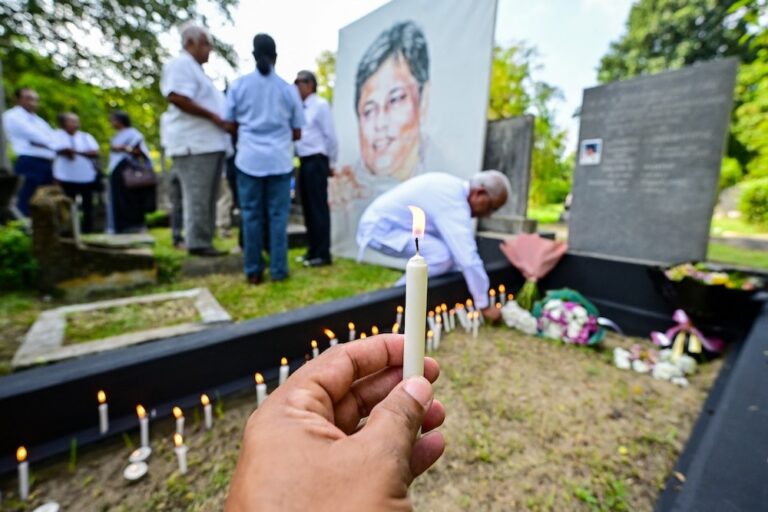(IFJ/IFEX) – The following is a 30 June 2008 IFJ media release: IFJ Supports Media Dialogue in Sri Lanka The International Federation of Journalists (IFJ) fully supports the efforts of the five media organisations in Sri Lanka to encourage dialogue with the country’s political parties in order to resolve the dangers and difficulties confronting journalists […]
(IFJ/IFEX) – The following is a 30 June 2008 IFJ media release:
IFJ Supports Media Dialogue in Sri Lanka
The International Federation of Journalists (IFJ) fully supports the efforts of the five media organisations in Sri Lanka to encourage dialogue with the country’s political parties in order to resolve the dangers and difficulties confronting journalists and media institutions in the country.
The five organisations representing journalists in Sri Lanka – the Free Media Movement (FMM), the Federation of Media Employees’ Trade Unions (FMETU), the Sri Lanka Working Journalists’ Association (SLWJA), the Sri Lanka Muslim Media Forum (SLMMF) and the Sri Lanka Tamil Journalists’ Alliance (SLTJA) – initiated a briefing with representatives of the country’s political parties on June 17.
As a result, the five organisations said that the 12 political parties present at the briefing made a commitment to implement a common program to protect media freedom and media personnel.
In a joint statement, the five organisations said the appointment of a ministerial subcommittee to investigate the serious concerns of media personnel was a positive step. The committee, however, must seek to build confidence among the media community, they said.
The IFJ endorses its Sri Lankan partners in encouraging the committee to report promptly and transparently about the progress of its inquiries.
“The ministerial subcommittee must take a different approach to that of a prior government-appointed inquiry into attacks and intimidation related to an incident at the Sri Lanka Rupavahini Corporation (SLRC) in late December 2007, for which no report or recommendations have been forthcoming,” IFJ Asia-Pacific said.
At the briefing, the journalists’ representatives said they would support any campaign for legislative reform to support media freedom, guarantee free and fair elections, protect trade union rights and abolish the executive presidency.
Issues raised during the briefing included, but were not confined to, the following.
– The culture of impunity regarding attacks on media personnel and the failure of authorities to investigate fully the murders of journalists and threats and intimidation of journalists.
– The series of attacks and intimidation of media personnel following a melee at the SLRC on December 27 involving Labour Minister Mervyn Silva.
– Postings on the Defence Ministry’s official website which branded media institutions, editors and the five media organisations as traitors and warned that the security forces would deal with them; as well as instructions for the media to adopt self-censorship.
– A warning by the Defence Secretary to two office-holders of two journalists’ organisations that their lives were at risk if they continued their activities.
– Leadership of the State-controlled Sri Lanka Broadcasting Corporation.
– Suppression of media activities in the Jaffna peninsula.
– The detention of senior Tamil journalist J.S. Tissainayagam for more than 100 days without charge.
The parties represented at the briefing were the Sri Lanka Freedom Party (which holds government), the United National Party, the Sri Lanka Muslim Congress, the Ceylon Workers’ Congress, the Jathika Hela Urumaya, the Lanka Samasamaja Party, the Upcountry People’s Front, the Western People’s Front, the United Socialist Front, the Left Front, the Leftist United Front Sri Lanka Freedom Party (people’s wing), and the United National Party (democratic wing).
The IFJ represents over 600,000 journalists in 122 countries.
For further information on the SLRC incident, see: http://ifex.org/en/content/view/full/91255


